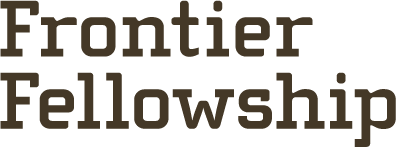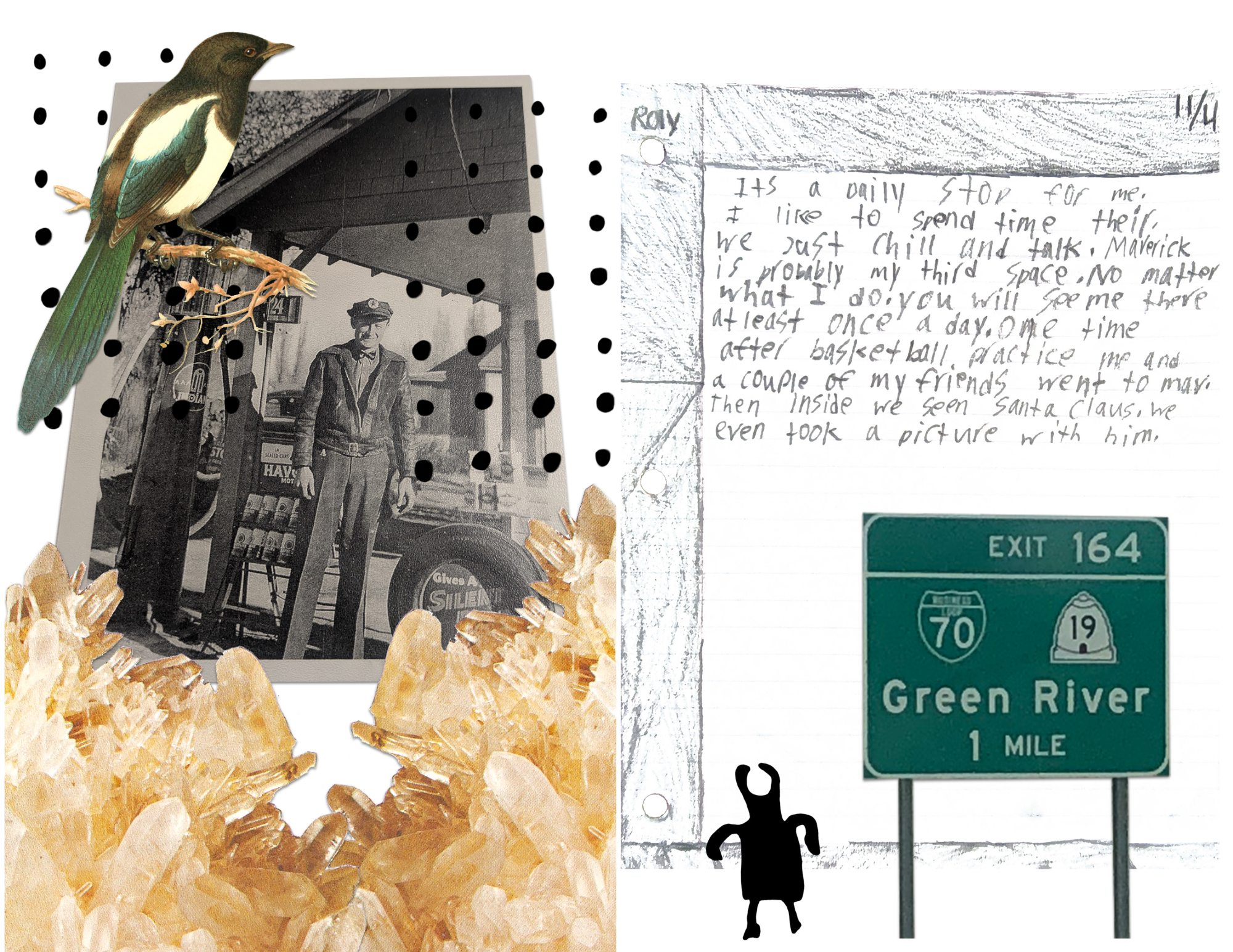Tadd Mecham

Frontier Fellow January 2021
Tadd’s Instagram
Tadd Mecham is a filmmaker and writer. He graduated from the University of Utah in 2015 with a Bachelors in Film and Media Arts. He is currently living in his hometown of Green River, UT, which has served as the filming location of three films currently in post production. When not shooting, editing or writing, you can find Tadd either out in nature or locked in a dark house playing video games/watching movies.
My personal experience with the desert and the city of Green River has grown throughout my life. It shifted from a place of wonder and exploration as a child, the freedom presented here endless, into a prison as a teenager, the isolation crushing and the endless expanse of nothingness as hopeless as life felt a lot of the time. But I find that as an adult the memories of otherness have cured into a nostalgia and comfort I never thought I would apply to my hometown.
I wrote the first draft of Mother almost 10 years ago, when I first left my home in Green River. I wrote a second draft three years ago, in the midst of realizing that I hated living in the city and I wanted to go home for good. And now, returning to Green River to live for the foreseeable future, I have finished the third and final draft.
I had a hard time choosing a film project applicable to the Frontier Fellowship, something that would make Epicenter proud, and kept coming back to Mother. The story of a young woman returning home after being called there by her missing, presumably dead, mother had become a sort of staple in my I'm never going to make that project folder for fear of it not turning out. But there comes a point as a shoestring budget filmmaker that acceptance of non-studio quality is key and that sitting on your hands will do absolutely nothing but allow you to keep the things you write in a folder on your computer for a decade. To be a filmmaker is to be constantly disappointed by the outcome of your work, but to also be constantly surprised by what a tiny film crew is capable of achieving in a few days.
Writing has always been the best part of filmmaking for me. Unlike filmmaking, writing is not difficult. Everything in my head is perfect and I can see it all exactly as it should be. The limitations of difficult lighting, a kink in the audio recording or how long multiple takes that include fake blood will be if the first shot doesn’t work (so much washing and drying) is not an issue. When I write I have already completed my vision and I know exactly what it is I want.
Screenplay for Mother.
Mother had been rewritten so many times because I would leave it alone for so long that I would essentially be a new person every time I thought about making it again. But the core theme stayed the same throughout: depression. I have struggled with mental illness most of my life and when the first draft of the film was written I was in a very dark, untreated place. What came from that draft was only hopelessness. It was essentially a way to lash out against how I felt so alone and how my hometown appeared to contribute to that feeling. The rewriting introduced my need to return home. Missing the desert. Not putting the desert as the source of evil anymore and instead looking inward to what depression can do to the mind. As it stands, the final draft is my best attempt at using the beautiful landscape surrounding Green River as a way to express some sort of otherworldliness. When Ivy, the protagonist of the film, feels the oppressiveness of her situation, it is inside of herself, letting past events fester and never letting them out. And the desert is able to present itself as escape from those demons instead of as the demons themselves.
The planning phase is also very easy for me on the surface. Creating a shot-list or a storyboard is as simple as reading the screenplay and logging what I see in my head. If a shot is complicated or specific it can be broken down into multiple parts or drawn out in order to give actors or whoever is operating the camera an idea of what we are going for. My main issue here, and for every past project I have ever done, is not getting enough B-roll. B-roll is just cutaways that relate to the story. Something that will flesh out the location or the story. If someone is thinking about their mother then maybe there is a cutaway of their mother. Or photos in the house. Plants. Literally anything to fully flesh out location or a character’s thoughts. The majority of that does not come forward until editing begins, so mapping out to the best of my ability is the name of the game. A secondary shot-list is created once I look at my footage and see everything I missed (which is also my least favorite part). Mother had a little over 300 individual shots over the course of a 4 day shooting period and we were able to get great coverage.
Character designs and storyboards for Mother.
Once everything is mapped out as good as it can be, and the actors are familiar with the screenplay, then comes what is alternately the most rewarding and the most difficult part of the process: the shoot. Different preparation comes with each project. How do you want to make it and with what tools? I have always been excited about the prospect of shooting as closely to no-budget as I can. I loved the idea that anyone can make a movie. And I don’t mean the indie films that are technically ‘low budget’ with $500,000 at their disposal. With my first film, Green River, I filmed on a DSLR camera and did not record any sound. I instead chose to dub it later, the actors all re-recording their dialog. The choice was not great and the end-product suffered because of it. But I wanted to see if it was possible.
It would seem I have still not learned my lesson and chose to take the concept even further with Mother. To record the entirety of the project on cell phones, sound included. I want to make something that anyone could potentially make. The added advantage is that instead of relying on one camera, we had as many as necessary. The conversation sequences would fly by because of multiple phones filming at once and combining the audio from both phones fleshed out the dialog sound, a happy accident all on its own. Of course the drawbacks are there as well. No zoom lens was a big one for me, the picture quality degrading the second any amount of zoom is applied, and the mic picks up a lot of breathing. To operate the camera in a cellphone filmed movie it is important to barely breathe.
Actors on location for the filming of Mother.
But restrictions are part of what I love when making a movie. Finding a way over weird hurdles. Trying to understand why a throwaway line of dialog is the hardest for an actor to deliver. Finding a way to make a difficult lighting or gore effect to work and then having it turn out better than expected. During the shooting process there are so many surprises that reinforce why everyone is gathered as a group to make a project work. The shoot is always rewarding, even when it gets really hard physically and mentally. Lugging a 100 pound generator off of a cliff and into a wash and then hauling it back out after the sun has gone down is worth it once I see the shot containing a glaring red light surrounding a figure in a place that should only be home to moonlight and nature.
The struggle is worth it.
Once captured and principal photography has wrapped up then comes the most imposing portion of the process: editing. In all honesty I wish that I was friends with an editor or had the money to pay for one. The process of editing is great when things come together, and this time around a lot of things thankfully did, but when things don’t work it means something is added to a new shot-list. It means scheduling more time with actors and struggling with date conflicts. It’s pretty exhausting.
The editing process on my first official film project was an absolute nightmare. We set out to make a short and it ended up a feature, meaning my first project was enormous and I had to wade through the editing process for the first time on my own. There were plenty of sleepless nights over that project and I still make notes in my head about how I can improve it anytime I think about it. But from that project came a lot of experience. Mother is not nearly as long and, although it does require a bit more shooting, is mostly complete. It will take many more hours at the computer, but it is something I know I can accomplish. Knowing I have cut my shooting time from 4 years, on and off, to under a week is empowering. The benefit of making art no matter the amount of resources can’t be understated. Experience is experience and it matters so much.
A still image from Mother.
Being able to push myself to make a film, something I haven’t done in what seems like forever, is a blessing. It helps me to find meaning in my life, as cheesy as that sounds. It would not have happened without Epicenter and the Frontier Fellowship. Having the resources, the little I required, is what made the project possible and to be able to make something without worrying about my bank account drying up provided the incentive to complete a project that may have otherwise stayed locked away forever, eternally rewritten. For that I am grateful. Art can be hard to make, but it gets easier without the added pressure of not really being able to afford it.
So for now I exist in post-film purgatory. I have everything together that I can have together and am waiting for the next time I can get my actor to Green River for some reshoots and some minor dialog recording. I fill in B-roll as I go. I can go into the desert if I need anything for the film and add it in. I am working with friends on the soundtrack ideas and I do my best to flesh out the audio.
Mother is nearly finished. It has been a long time coming.
-----
Stay tuned to Epicenter’s social media for announcements about the future screening of local resident and artist Tadd Mecham’s film Mother.












